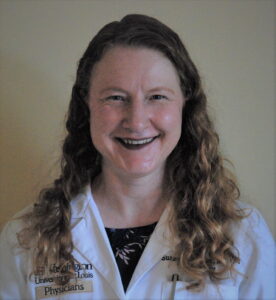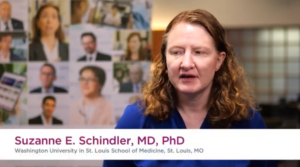Associate Professor of Neurology
Adult, Aging & Dementia
Suzanne Schindler, MD (Links to an external site)


Associate Professor of Neurology
Adult, Aging & Dementia
You are invited to Coffee and Conversations featuring Dr. Suzanne Schindler, clinical neurologist and dementia specialist. Feb. 27, 2024 from 10-10:30 a.m. 117 N. Kirkwood Rd., Ste. 201 Attend virtually or in-person RSVP or submit questions at info@hopehappens.org
Speaker: Suzanne Schindler Grand Rounds will be in person and participants are invited to watch the lecture at 7:45 a.m. in either the Connor or Moore Auditoriums. A zoom link will be emailed for participants not able to attend in person. This link is a recurring meeting link for all Neurology Grand Rounds. All lectures […]

Suzanne Schindler, MD, PhD, Washington University in St. Louis School of Medicine, St. Louis, MO, discusses the promise of blood-based biomarkers for treatment monitoring. Data has been presented on plasma phosphorylated-tau 217 (p-tau217) as a method to monitor the effects of lecanemab and donanemab. This research is investigating if medication discontinuation is feasible if p-tau217 […]

Suzanne Schindler, MD, PhD, Washington University in St. Louis School of Medicine, St. Louis, MO, gives insight into the need for more diverse cohorts to improve our understanding of the impact of sex, age, and race on biomarker levels and trajectories in Alzheimer’s disease. While efforts to study racial and ethnic minority populations have improved, […]
What makes our residency special? Hear from our faculty When choosing a residency program, it’s important to know who you’ll be working with and getting a sense if we are a great fit for you. Below is a list of pre-recorded topics from several of our researchers and subspecialty experts here in the Department of […]
Class of 2024 Name Position Location Busranur Agac Neuroimmunology and NeuroinfectiousDiseases Fellow National Institutes of Health (NIH) Ravi Chopra Neuromuscular Fellow Washington University in St. Louis Jesse Crayle Neuromuscular Fellow Washington University in St. Louis Maren Gregersen Dementia Fellow Washington University in St. Louis Tina Kiguradze Epilepsy Fellow Washington University in St. Louis Gabrielle Lindley […]

Alzheimer’s disease starts forming in the brains of unsuspecting individuals about 20 years before traditional telltale signs become noticeable. No cure exists for the progressive, fatal disease, but St. Louis medical researchers are studying tools and potential drugs that can detect and treat Alzheimer’s in its early stages. “The tests are getting better and better,” […]